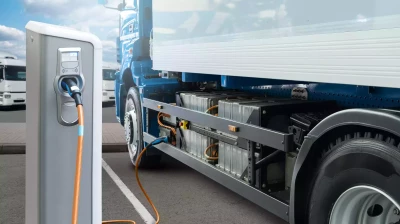Truckers sound off on electric truck regulations
July 5, 2023
 It seems that the trucking industry has seen more regulatory changes in the past twelve months than ever before. Among these changes are proposals that would heavily favor the adoption of all-electric trucks and other alternative fuels. With regulators rushing to get ahead of the electric vehicle trend, the potential for chaos in the transport industry is high. How do average working truckers feel about the regulatory shift toward an all-electric future?
It seems that the trucking industry has seen more regulatory changes in the past twelve months than ever before. Among these changes are proposals that would heavily favor the adoption of all-electric trucks and other alternative fuels. With regulators rushing to get ahead of the electric vehicle trend, the potential for chaos in the transport industry is high. How do average working truckers feel about the regulatory shift toward an all-electric future?
“With the stuff that we’re seeing from the EPA, my members are very concerned,” says Lewie Pugh, Executive Vice President at the OOIDA.
Pugh sees EPA regulations on electric trucks as an extension of policies from 2011 that mandated more efficient engines for trucks operating in the US. These policies caused frustration across the industry as companies were shouldered with the burdensome expense of overhauling their fleets. Many small operations were even forced out of business entirely due to these changes.
Watch the latest episode of the Stay In Your Lane Podcast to discover how truckers are making their voices heard in the debate over electric truck mandates.
“I had a 2012 truck that I bought new myself,” Pugh explains. “I don’t like to say I’m a victim because I was able to get through it. But it was definitely hard on my business.”
As electric truck mandates unfold, Pugh fears that many owner operators today will face similar hardships to what he experienced a decade ago. Rather than letting policy drive the conversation on new technologies, he believes that innovation should come from within the industry itself.
“They’re always going after trucking for clean air,” says Pugh. “We all know that trucks are pretty doggone clean nowadays. Maybe it’s time to back off and let manufacturers come up with what’s the future.”
Like everyone else, truckers appreciate the need for a clean and healthy environment. The transport industry has made great strides in reducing emissions in recent decades, and regulation has played an important role in that shift. Still, Pugh and other trucking advocates warn that regulation goes too far when it begins to harm small businesses.
Some figures in Washington are listening to truckers’ concerns about the rapid shift to electric. At the behest of the OOIDA, Democratic Senator Joe Manchin of West Virginia has helped to slow the EPA’s push toward mandating the technology. Still, new regulation in favor of electric trucks seems inevitable in the near future.
Some believe that policymakers from outside the industry are uninformed on the day-to-day realities of working truckers who must deal with the consequences of regulation. The changes in 2011 brought about countless unintended consequences for the environment that have taken years to unravel. Likewise, a hasty shift to electric trucks will likely yield unexpected negative outcomes unless the transition is managed thoughtfully.
Rather than top-down mandates that could produce harmful consequences, Pugh says electric technology should stand on its own and earn a place in the free market.
“The way we became a superpower was capitalism and the free market,” he argues. “We allowed businesses to figure out what worked, what you could send to market, and what the end consumer would buy.”
New technologies are often met with trepidation in the trucking business. Like the shift to electronic engines a generation ago, Pugh believes that electric vehicles could eventually find their place if end users find value in the technology on its own merits.
“At the end of the day, trucking is a business. Most successful business owners are looking for a cheaper, more efficient way to do things,” he says. “If you can bring technology…that’s more efficient and cheaper, the industry is going to embrace it. We don’t need to mandate that.”
The trucking industry shares in the vision for a cleaner future. For the adoption of electric vehicles to go over with minimal negative impact to business and the supply chain, it cannot be led by mandates alone. Keep up with all the latest on the conversation surrounding alternative fuels by subscribing to the Stay In Your Lane Podcast from Triple T Transport.














